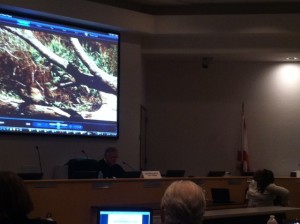It rained buckets in Ft. McCoy, Florida last July; more than five inches by mid-month. When the skies finally cleared, 67-year-old Joyce Tyson went for a walk down the road to her daughter Audra’s horse ranch. That’s when she saw it: a culvert that drains water from the new cattle ranch next door to Tysons’ was spewing “a waterfall of poopy water” onto their property. They got a home video camera and recorded it.
Tysons have had cattle on their land for three generations, though they are down to 50 acres from the original 800. But there’s a new cowboy in town now. Frank Stronach is an Austrian billionaire who bought 25,000 acres surrounding the Tysons. He’s building a ranch called Sleepy Creek Lands that will eventually hold up to 15,000 head of beef cattle, more than all of Marion County’s cattle farms combined. When he applied for a water withdrawal permit that was larger than the city of Ocala’s permit, which serves 60,000 residents, environmentalists and some citizens began to protest.
Ft. McCoy is a rural town known for horse and cattle ranches where some residents trace their lineage back to the state’s first settlers. But as Florida grew rapidly during the 1900’s, those who’ve lived close to the land for generations now find themselves in competition with newcomers for resources, especially water. Ever-higher demand for water, combined with more runoff from factories, farms, and residences, has polluted springs and rivers, like the Ocklawaha River, where Joyce says her property drains.
For folks like the Tysons, Stronach has brought Florida’s pro-growth vs. environmental protection policies right to their fence line.
“I admit at first I was not really concerned about the cattle ranch. We’ve had cattle, and it’s like, what’s the big deal?” said Joyce. Though the ranch is still being built, Joyce estimates there are already “hundreds and hundreds” of cattle there now, and they’ve attracted horseflies. “Our horses would just run and be crazy,” she said. “You couldn’t tell what color our few cows were because of them.”
Daughter Audra Tyson owns a horse-training business on her property next door to her parents. She says her new neighbor has brought “flies, rats, and stink.” She’s upset with Stronach for putting his feed pile right on her property line. Then every few days they come with trucks to load up some feed to take to cattle on other parts of the ranch. So instead of the quiet she’s used to in this one-intersection town, she hears Stronach’s equipment running all evening.
“When they stir that feed up, then the rats come out. Get into my barn and even my house,” she said.

Joyce called the Florida Department of Environmental Protection, who sent an inspector out, but by the time he got there, it had quit raining and much of the water had dried up. He told the Tysons there was nothing the agency could do – the ranch didn’t qualify as feedlot because it didn’t have 300 or more cows, which would then require regulation. The irony is that the FDEP issued a report in July 2012 stating its goal for area waterways is to reduce nitrogen by 79%. Sources of nitrogen include runoff from fertilizer, sewage, and livestock. The report says “A small percentage of nitrate leeching from improperly stored manure can contribute a significant load of nitrate to groundwater and receiving springs.”
The FDEP has not yet responded to information requests, but inspections at the agency have decreased overall. One reason may be the budget, which is down from a high in 2006 under Gov. Jeb Bush of $2.9 billion dollars a year to $1.5 billion dollars in 2015. Inspections are down from around 1,500 per year in ‘07 to 130. Penalties are down from $9.3 million dollars to $1.4 million dollars.
But there’s also been a change in culture at state agencies under the current administration. An October 2014 article by long-time environmental reporter Craig Pittman at the Tampa Bay Times said veteran employees were replaced by people “connected to the industries the agency regulates.”
Environmental consultant Adam Hoyles of Jacksonville-based Onsite Environmental Monitoring said the culture for the state’s regulatory agencies changed from “guardians of the environment to service agencies.” Their mandate is to help businesses get permits and resolve environmental problems. Staffers were told to “play nice,” he said. Hoyles, an ecologist with 30 years of experience on both the regulatory side and the business consulting side, says the result has been “a mixed bag.” On one hand, projects get approved faster, which is a benefit for those that meet the legal requirements.
But on the other hand, Hoyle says he’s not surprised Tysons couldn’t get any help from regulators. “There just isn’t the will right now,” he said.
With no help from regulators, Audra finally got Stronach’s ranch manager to spray for horseflies by threatening to call the TV station. (Ranch officials did not return calls for comment. Tallahassee-based North Public Relations, who represents the ranch, declined comment due to ongoing litigation.)
Lawsuits were filed in June by two environmental groups against the St. Johns River Water Management District, claiming the water permit it issued to the ranch was not in the public interest. In August, an administrative judge held a hearing and public comment session in response to the lawsuit. Joyce and Audra went to the meeting and Joyce signed up to speak.
After she was sworn in by the judge, she said, “I want to admit that I’m very nervous, but I felt that what I had to share was important enough to endure the embarrassment that I might cause myself here.” The “poopy water” video was projected over a large screen while Joyce narrated the problems they’ve had. At the end, she told the judge, “I wanted you to know in case there was any doubt that there is a real threat of pollution to the Ocklawaha (River). It’s real. Thank you.”
Fall has brought cooler temperatures to Ft. McCoy, with a few nights already in the 30s. Last year when Audra ran her heat, she could smell Sleepy Creek’s feed pile inside her house. She said it smelled like sour milk. The Tysons have also started worrying about their wells, which are only 100 – 150 feet from the property line. But with state agencies unable or unwilling to help, the only recourse for them is for the judge to recommend that the ranch isn’t in the public interest, an opinion that’s due any day now. Then, the final decision will be made by the Governing Board of the water management district, political appointees with a mandate to “play nice.”
As competition for natural resources reaches into the quiet pockets of Florida, voters may have to decide: just whose land is it anyway?


2 Responses
Joyce Tyson
Very good article and informative Website. Will visit again
Thanks Joyce
editor@floridafieldnotes.com
Thank you so much for the feedback! Happy to hear from you!